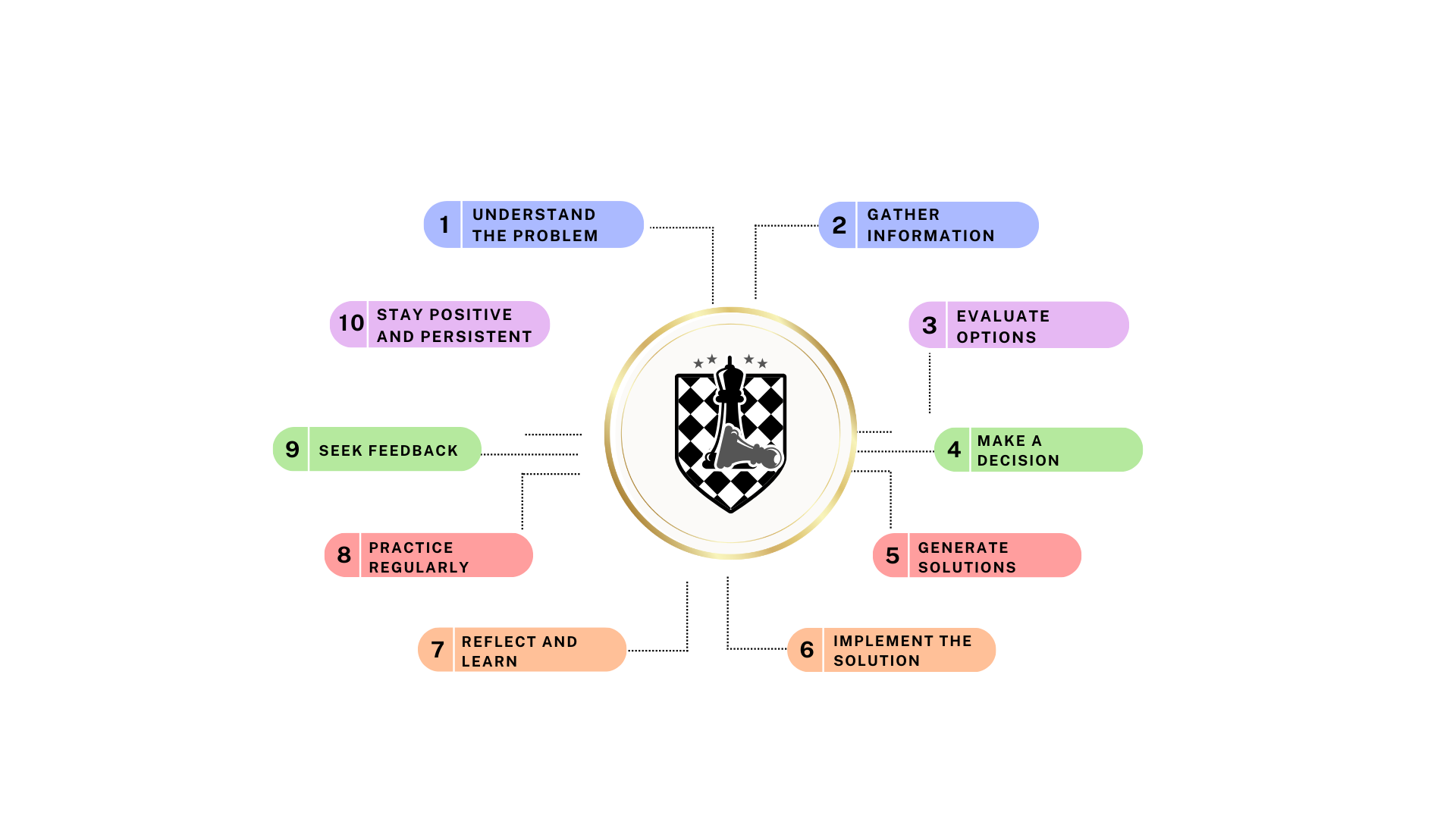Improves problem-solving skills
Problems Solving in chess refers to the ability to comprehend the underlying principles, concepts, and dynamics of positions and games. It goes beyond simply memorizing moves or following general guidelines and involves a deeper grasp of the game's strategic and tactical intricacies.
To Explain how problem-solving skills improve by learning chess or playing chess, We broke it down into small sections.

1) Understand the Problem: Clearly define the problem you're facing. Break it down into smaller, manageable parts. Sometimes, what appears to be a single problem might actually be a combination of several smaller issues. Chess is game of moving pieces on the board. Every moves connected with some logic and idea of either creating a attack or defending some position. In a way, every move may create a problem or solve a problem. So understanding always gets examined while making a move.
2) Gathering information:In chess, gathering information is a critical aspect of developing a successful strategy. It is used not only for opening theory but also for piece placement, continually evaluating tactical possibilities and threats on the board. Gathering information is crucial for identifying mistakes, missed opportunities, and areas for improvement during post-game analysis of your games. Without gathering information, it would not be possible to conduct a thorough analysis of your gameplay.
3)Evaluate options: When we play chess, evaluating our options is crucial to determine the best move for a given position. This involves analyzing the potential moves and assessing their strengths and weaknesses. We must consider various factors like tactical opportunities, piece activity, and King safety. Additionally, the possibility of a draw and time constraints can significantly impact our decision-making process. Memory and pressure management are also crucial skills required for successful chess playing.
4) Make a decision: When playing chess, making the right decisions involves a few steps. First, you need to assess the current position of the game. Then, you need to come up with a plan based on your assessment. Finally, you need to evaluate potential moves and select the best one. However, keep in mind that your opponent will always challenge your decision with their own move and plan, so be prepared to adjust accordingly. It's essential to maintain objectivity throughout the decision-making process. Also, remember that time is a crucial factor in chess, and the game can end in a draw, which can always come as a surprise.
5) Generate Solutions: Chess is a game that requires you to identify and carry out a sequence of moves that lead to a favorable position or achieve specific objectives. In order to come up with a winning solution, you need to continuously work on improving the placement or coordination of your pieces, exploit any weaknesses in your opponent's position, control key squares or diagonals, or prepare for a specific tactical operation.
6) Implement the solution : Chess is a game that requires you to identify and carry out a sequence of moves that lead to a favorable position or achieve specific objectives. In order to come up with a winning solution, you need to continuously work on improving the placement or coordination of your pieces, exploit any weaknesses in your opponent's position, control key squares or diagonals, or prepare for a specific tactical operation.
7) Reflect and learn : Chess is a game that requires you to identify and carry out a sequence of moves that lead to a favorable position or achieve specific objectives. In order to come up with a winning solution, you need to continuously work on improving the placement or coordination of your pieces, exploit any weaknesses in your opponent's position, control key squares or diagonals, or prepare for a specific tactical operation.
8) Practice Regularly : Chess is a game that requires you to identify and carry out a sequence of moves that lead to a favorable position or achieve specific objectives. In order to come up with a winning solution, you need to continuously work on improving the placement or coordination of your pieces, exploit any weaknesses in your opponent's position, control key squares or diagonals, or prepare for a specific tactical operation.
9) Seek Feedback : Chess is a game that requires you to identify and carry out a sequence of moves that lead to a favorable position or achieve specific objectives. In order to come up with a winning solution, you need to continuously work on improving the placement or coordination of your pieces, exploit any weaknesses in your opponent's position, control key squares or diagonals, or prepare for a specific tactical operation.
10) Stay Positive and Persistent : Chess is a game that requires you to identify and carry out a sequence of moves that lead to a favorable position or achieve specific objectives. In order to come up with a winning solution, you need to continuously work on improving the placement or coordination of your pieces, exploit any weaknesses in your opponent's position, control key squares or diagonals, or prepare for a specific tactical operation.
